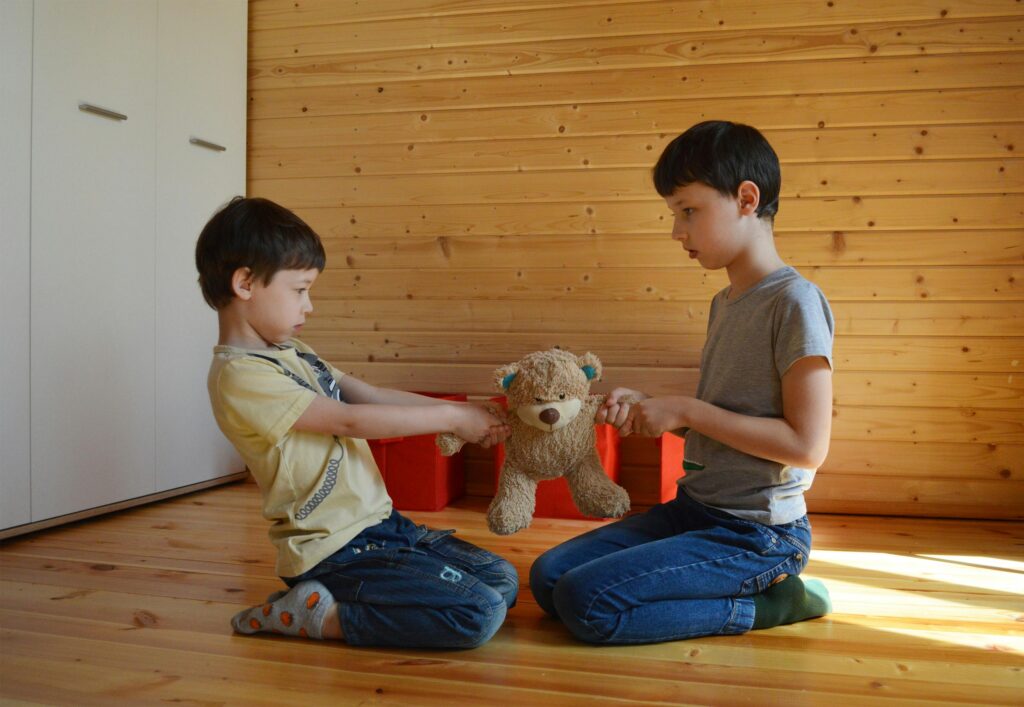Sibling conflicts can arise from various sources and manifest in different ways. Here are some common types of conflicts that may occur between siblings:
Verbal or Physical Fighting: This includes arguing, name-calling, hitting, pushing, and other forms of physical aggression.
Jealousy and Envy: Siblings may feel jealous of each other’s achievements, possessions, or the attention they receive from parents.
Competition for Parental Attention: Siblings often compete for their parents’ attention and approval, which can lead to conflicts.
Tattling and Bickering: Constantly reporting each other’s misdeeds or engaging in minor, ongoing arguments.
Resentment and Unfairness: Feelings of unfair treatment or favouritism can cause resentment and lead to conflicts.
Provoking and Teasing: Siblings may provoke or tease each other to get a reaction, which can escalate into more serious conflicts.
Hidden Struggles: Some conflicts are less obvious, such as feelings of inadequacy compared to a more successful sibling, or internalized anger and resentment.
Understanding these types of conflicts can help you address the underlying issues and foster a more harmonious relationship between your children.
Do you have a specific type of conflict in mind that you’re dealing with?
While it is a common part of growing up, managing it effectively is essential for maintaining healthy family relationships.
Here are Some Strategies You May Use to Handle Your Children’s Conflicts
Teach Conflict Resolution:
- Teach kids how to handle disagreements constructively among themselves. Encourage active listening, empathy, and finding solutions together.
- When children learn positive conflict resolution skills, they can apply them in future relationships.
Cast Sibling Harmony as Important:
- Explain to your children that your family is like a team. Just like any good team, everyone—parents and kids—needs to work together for a peaceful and loving home.
- Emphasize that any fights among family members can hurt the whole team or the family.
Step In When Necessary:
- While some conflicts can be resolved independently, parents should intervene when needed.
- Provide guidance, mediate disputes, and encourage respectful communication.
Promote Individuality and Fairness:
- Recognize and celebrate each child’s unique qualities and interests.
- Ensure fairness in rules, responsibilities, and attention. Avoid favouritisms.
Create a Positive Environment:
- Foster a home environment where kindness, cooperation, and respect are valued.
- Encourage siblings to express their feelings without hurting each other.
Set Clear Expectations and Consequences:

- Establish clear rules and expectations regarding behaviour.
- Consistently apply consequences for negative actions, such as time-outs or loss of privileges.
Encourage Bonding Activities:
- Plan activities that promote bonding, such as family outings, game nights, or shared hobbies.
- Create positive memories together. Remember, sibling rivalry is normal, but with patience, understanding, and effective management, you can create a harmonious family environment.
Celebrating your child’s achievements can boost their self-esteem and motivate them to continue striving for success/fairness
Here are some effective and enjoyable ways to celebrate their glories:
Verbal Praise: Simply acknowledging their efforts with specific praise can be very powerful. For example, “I’m so proud of how hard you worked on your project!”
Special One-on-One Time: Spend quality time doing something your child loves, like going to the park, playing a game, or reading together.
Create a Success Wall: Dedicate a space in your home to display their achievements, such as certificates, artwork, or school assignments.
Customized Certificates: Design and print certificates for specific accomplishments. This can make their achievements feel official and special.
Family Celebration: Have a family movie or game night where your child gets to pick the movie or game. This reinforces family bonding and makes them feel celebrated1.
Cook Their Favourite Meal: Celebrate with a special dinner featuring your child’s favourite foods. Involving them in the meal preparation can make it even more special.
Create a Celebration Jar: Fill a jar with notes of congratulations and positive affirmations. Your child can pull out a note whenever they need a confidence boost.
Public Recognition: Share their achievements with extended family or friends, or even on social media if your child is comfortable with it. Public recognition can be a powerful form of positive reinforcement.
Achievement System: Use a system of badges or stickers for different types of achievements. This visual representation can be very motivating for children.
Encourage Reflection: Take time to talk about their achievements and how they feel about them. This helps them internalize their success and understand the value of their efforts.
By celebrating your child’s achievements in these ways, you can help them feel valued and motivated to continue doing their best.
Do you have a specific achievement in mind that you’d like to celebrate?

